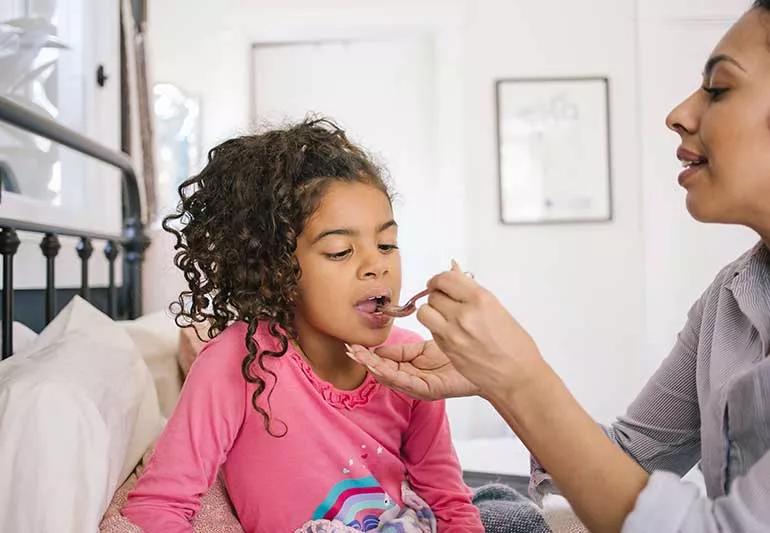Kids under 4 shouldn’t use cough and cold medicine — older kids may or may not benefit

The sound of your child coughing is the parenting equivalent of nails on a chalkboard, isn’t it?
Advertisement
Cleveland Clinic is a non-profit academic medical center. Advertising on our site helps support our mission. We do not endorse non-Cleveland Clinic products or services. Policy
You’ll do just about anything to make it stop. Because it’s so pitiful. So heartbreaking. So … cringe.
But before you reach for that bottle of cough and cold medicine for kids, take a step back for a second. Coughing it out — as shuddering as it is — might actually be just what your kid needs.
“A cough is typically an important and healthy reflex. It’s a protective measure for your body,” explains pediatrician Raj Rambhatla, MD. “Coughing helps remove all the secretions and debris from your breathing passages. So, it’s not always a great idea to suppress it.”
And the risks of over-the-counter cough medicines can be high.
Dr. Rambhatla shares advice about using cold and cough medicine and suggestions for cough-relief methods that may work even better.
Your kid’s age plays a big part in determining whether cough medicine should even be a consideration. The American Academy of Pediatrics (AAP) advises that the risk of cough and cold medicine often outweighs any benefits. And young children shouldn’t use it at all.
The AAP recommendations state:
Advertisement
“If a 10-year-old has a cough but is otherwise feeling well enough to go to school, it can be understandable to give them a dose of cough medicine to try to help them get through the day. Coughing in school can be disruptive for their learning and for the rest of the class,” Dr. Rambhatla acknowledges. “But it’s not something that always works or that is always needed.”
Why the concern about using cough medicine in kids? After all, it’s readily available over the counter at drugstores — doesn’t that make it safe?
Dr. Rambhatla explains some of the downsides of cold and cough medicine for children.
Kids cold and cough medicines can cause dangerous side effects in kids under the age of 4, like:
And even in older kids, cold and cough medications can have side effects like drowsiness, dizziness, nausea and more. If you do choose to try cough medicine, watch your child for side effects. You may just be trading one uncomfortable symptom for another.
Medicines for colds and coughs tend to include more than one medication to suppress cold symptoms. That can cause dosing problems if you’re not vigilant, Dr. Rambhatla warns.
Common cough and cold medicines for children typically include one or more of the following medications:
For example, your cold medicine may include both an expectorant and a pain reliever like Tylenol® (acetaminophen). But you were thinking of the cough medicine as a remedy exclusively for your child’s cough. So, you give them Tylenol, too, to relieve their other cold symptoms, like a headache or fever. Now, your child, inadvertently, has been given a double dose of Tylenol. That can cause acetaminophen toxicity, a potentially serious condition.
If you do choose to give your older child cough and cold products, be very sure to read the labels carefully. Know what’s in the medication, and follow proper dosing instructions. If you have questions or concerns about medication interactions, contact a healthcare provider, like a pediatrician or a pharmacist.
Sometimes, it’s easy to think that giving medicine has to be the best answer for getting your kiddo feeling better, but that’s not necessarily the case.
Advertisement
Consider this: Some researchers have suggested that honey may be more effective for treating coughs than diphenhydramine, the active ingredient in some cold and cough brands, like Benadryl®. (Note that honey should never be given to children under the age of 1, due to the risk of botulism.)
“When we look at the risks versus the potential for rewards, there’s not enough evidence in most cases to say that cough medicine is the best choice,” Dr. Rambhatla notes.
If cough medicine isn’t the answer, then what is? Even if a cough can be a natural and beneficial symptom, you still don’t want to see your child miserable (or risk them sharing their germs).
Dr. Rambhatla suggests a few ways to calm the cough — medication-free:
Advertisement
If nighttime coughing is a problem, give your child an extra pillow or two under their head to help keep them elevated. (But pillows shouldn’t be used for children under the age of 2.)
Cold symptoms and fevers in little babies should always warrant a call to their healthcare provider, particularly in babies under 3 months old. But in toddlers and older kids, colds and coughs here and there are, unfortunately, just part of life.
Most coughs clear up on their own in less than a week, but some can last two to three weeks.
If you suspect your child may have COVID-19, RSV or the flu, it’s probably worth getting tested to know for sure. And if your child shows any of these symptoms, Dr. Rambhatla advises seeking medical care:
It’s hard to see your child feeling sick. But cough medicine isn’t always the right choice. Know there are other ways to calm the cough, and talk with a children’s healthcare provider if you’re worried about their symptoms.
Advertisement
Learn more about our editorial process.
Advertisement

Honey can help relieve a cough by lowering inflammation in your airways and loosening up mucus

Dry coughs mean irritation, while wet coughs mean mucus

Germs spread quickly and easily, so covering your face, washing your hands and avoiding close contact are key

A chronic cough is one that lasts for eight weeks or more — and means you should see a healthcare provider

Over-the-counter options range from syrups to pills, lozenges to menthol rubs — but medication isn’t always the best treatment

Certain medicines and home remedies like ginger, honey and thyme can help calm a cough

Germ-killing chemicals in the water can lead to respiratory issues

Taking a warm shower before bed and drinking warm liquids throughout the day can help

Wearing a scarf, adjusting your outdoor activities and following your asthma treatment plan can help limit breathing problems

Your diet in the weeks, days and hours ahead of your race can power you to the finish line

When someone guilt trips you, they’re using emotionally manipulative behavior to try to get you to act a certain way